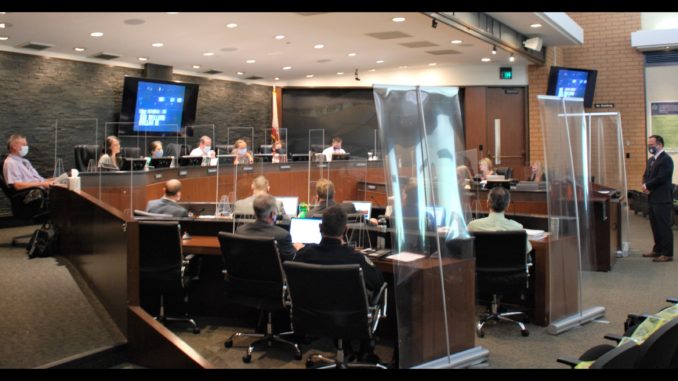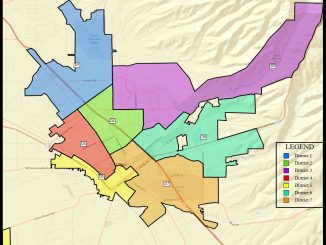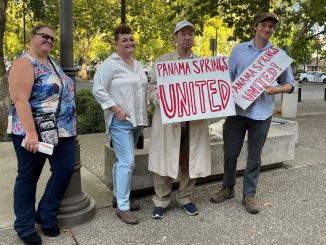
A two-part Chico City Council meeting Tuesday (May 18) served as a Rorschach test for the handful of citizens in attendance and those who watched on Zoom. Whether the conservative majority took progressive steps or acted with regressiveness was in the eye of the beholder.
In the four-hour afternoon session dedicated to the 2021-22 budget, the council’s five conservatives and two liberals unanimously passed a resolution supporting budget recommendations presented by city staff, modified by several policy revisions along the way—most notably, on a 4-3 vote, overturning the ban on single-use plastic water bottles at municipal meetings.
In the night session, which went nearly three hours before a closed session of more than an hour, decisions included allocating federal community development funds for mitigating effects of COVID-19 to a homeless family program through CHAT (Community Housing Action Team) and toward exploring options for temporary sheltering. The latter contained a proviso that proposals incorporate outreach to encourage unhoused individuals to seek services; later, the council superseded a motion to extend the city’s declaration of a shelter crisis, which expires June 30, and instead instructed staff to quantify that designation’s impact on the city and its service providers.
Councilmember Alex Brown, who’d relayed implications of the declaration to colleagues via emails from Butte County officials, expressed frustration.
“I don’t want to discount the positive movement toward funding CHAT’s temporary housing solutions—that’s one tier on the continuum of services that absolutely needs attention, and I’m grateful that that happened,” Brown told the CN&R afterward. “We cannot even begin to deny that we are in a shelter crisis at this moment. We are facing legal recourse as a result of inaction and actions that are actually harmful to people experiencing homelessness that have been taken in the last several months, and so it was up to this council to right their wrong of voting to rescind the shelter crisis in the first place.”
As City Attorney Vince Ewing explained Tuesday, the declaration dates to October 2018 (just ahead of the Camp Fire). Having it in place gives service providers within the city’s jurisdiction access to funds designated for shelter crises and allows the city to relax certain regulations, such as zoning ordinances to allow emergency construction like the FEMA housing on Hegan Lane and to encourage the development of additional sheltering options.
April 6, along partisan lines, the council voted to rescind the declaration. However, since that action was not agendized for the meeting, the vote was moot. Brown requested Tuesday’s discussion in the hope of precluding another rescission and made a motion that proposed a two-year extension.
Asked by Councilman Scott Huber if the declaration presented any downside, attorney Ewing responded, “I’m not aware of any specific drawbacks,” and City Manager Mark Orme said, “I’m not aware of any drawbacks, either.”
Nonetheless, Mayor Andrew Coolidge made the substitute motion to seek information directly from city staff (rather than county emails provided by Brown), which Vice Mayor Kasey Reynolds seconded. Reynolds ultimately joined Brown in dissent, though it passed 5-2, with staff instructed to ascertain from the county Continuum of Care what funding local service providers have received specifically connected to the shelter crisis and how removing that designation would impact the city moving forward.
By phone this morning (May 19), Coolidge said he’d voted for the declaration three years ago, during his first council term, but now wanted to understand the full implications before supporting it again.
“Being the deciding vote back then, not really knowing in exact detail what that brought or what that led to—and, yes, Alex brought forth some of that information—we really don’t have, publicly, any information out there about what it’s done,” he said. “If we do this, I want the public to understand why we’re doing this and what the benefit is for Chico. I just want there to be full disclosure on that.”
Brown stressed the looming deadline for the present declaration and, upon hearing the substitute motion, offered to amend her motion to fold in Coolidge’s request for a report, thereby expediting the process. (Coolidge’s motion preempted Brown’s and got the vote.) The mayor told the CN&R that he could call a special meeting in order to meet the required timeline.
As for the federal funding discussion, initiated by a request from Councilwoman Kami Denlay, City Housing Manager Marie Demers presented a breakdown of special monies from the U.S. Department of Housing and Urban Development for COVID-19 relief under the Community Development Block Grant (CDBG). Subtracting $127,000 already allocated for services, the city has $866,146 available, and staff recommended a handful of uses.
Council consensus arose to extend a CHAT program that transitions homeless families into permanent housing—a program, ironically, that currently gets funding from a grant only possible under the shelter crisis declaration.
Coolidge proposed dedicating the full amount to temporary shelter operations and outreach, but his motion died without a second. Instead, the council voted unanimously to allocate $282,933 to CHAT and the balance—$583,213—to sheltering solutions, with outreach, that staff will bring back for approval.
“I’m really excited and happy that funding seems to be going in a good direction where it’s really needed,” CHAT Executive Director Leslie Johnson said afterward, “both for the family housing program that CHAT has, of course, but also for the prospect of having some kind of new shelter program for the people who are still living outdoors, unsheltered.”
That the shelter crisis discussion featured a push from Denlay and Reynolds to declare a “drug addiction and mental health crisis,” either instead of or along with the shelter crisis, wasn’t lost on CHAT co-founder Bob Trausch.
“That’s why we’ve been successful: We get them inside, we stabilize them,” he told the CN&R, adding: “Once they’re in a home, everything changes for people on the street.”
Money talk
The budget workshop, an annual session at which city staff presents its financial plan and requests for departmental funding, yielded little division on the dais save for Coolidge’s motion about water bottles.
In reviewing a $143 million municipal budget, Coolidge homed in on a fiscal policy that precluded the city from purchasing water in single-use plastic bottles. Staff instead provides drinking water in carafes at meetings. This practice, he explained, represents an added expense for the city.
Councilman Sean Morgan wholeheartedly agreed. (In fact, during the night session, he sipped from a small plastic water bottle.) He also questioned the city’s “fair trade” policy that gives preference to products from developing countries where producers get paid a fair wage, provided the city receives competitive pricing. Morgan seconded Coolidge’s motion, which just barely passed when Councilwoman Deepika Tandon joined Brown and Huber in opposition.
Coolidge told the CN&R that he considers the move sustainable as well as cost-saving, because currently staff filters water that not everyone drinks—from cups that must get placed—versus bottles that can be taken to a local recycler.
“Who am I to weigh the carbon impact or the water impact of both sides of that discussion?” he said. “But I think that’s debatable, and certainly there’s a [quantifiable] staff time involved, and while that’s minor, we should turn off the lights when we leave the council chambers, too—maybe that’s a discussion a council should have.”
Brown, co-author of the Chico Green New Deal to address climate change, criticized the move as “a slap in the face to any environmental effort anywhere. Low-hanging fruit [for encouraging conservation] is to do the best you can to get people to use reusable, refillable water bottles. That motion was haphazard, self-serving and had no rational basis to it—not to mention absolutely threatening the environmental crisis that we’re facing as a nation and a world.”
Otherwise, the council agreed on the plan that staff will bring back at the June 3 council meeting. If ratified then, as projected, it would keep the city in the black while allowing staffing increases in several departments, notably Public Works and Community Development. Staff themed the presentation around The Six Million Dollar Man TV show, referring to the city’s government as the $8 Million Man for going from an $8 million deficit eight years ago to a general fund surplus of $20.3 million now.
Specters still loom. Unfunded pension liability of over $140 million—a debt to the state that claims an increasing amount of the general fund each year—has the city considering a bond issuance; Administrative Services Director Scott Dowell said a public information meeting on the issue will be held June 8. Orme also refloated the notion of a sales tax increase, which the previous council declined to put before voters last November.
“We’ve got a marked improvement in terms of adding in additional time and additional staff in departments that are in desperate need of it, as well as maintaining that fiscal responsibility, pushing forward with that financial future with protections coming in over the next five years in a way that are very encouraging,” Coolidge said. “Having been on the council before, right after the financial crisis that the city experienced, versus being on the council now during this period of time, it’s amazing.”




Be the first to comment